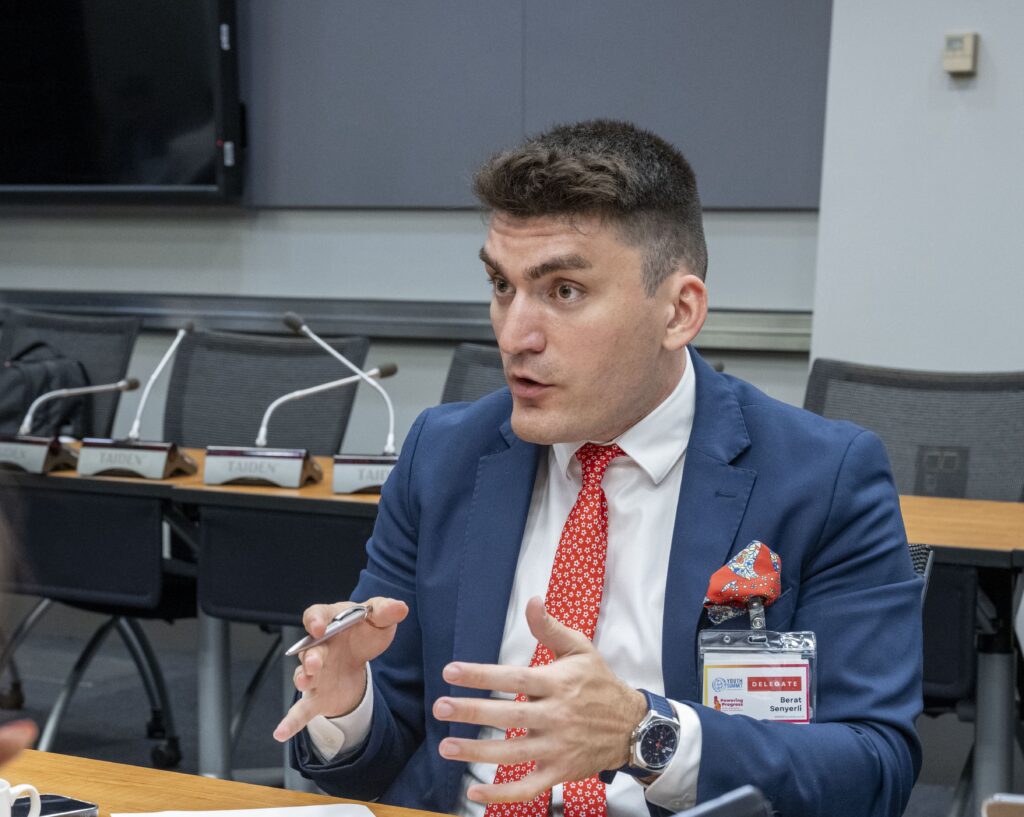Interview with Berat Senyerli: As the world grapples with the challenges of climate change, social inequality, and economic instability, sustainability and digital transformation have become essential pillars for future growth. Environmental, social, and governance (ESG) principles are now driving not only the investment strategies of large corporations but also global discussions on how to create a more equitable and inclusive economy. At the heart of this transformation is the role of youth and technology, two forces that are reshaping industries and pushing the boundaries of innovation.
We explore these pivotal topics with Berat Senyerli, a recognised expert in ESG and sustainability, who the World Bank Group recently invited as the EU and EMEA Delegate to attend the World Bank Global Youth Summit, which is the largest annual gathering of youth hosted by the World Bank Group worldwide. His work focuses on the intersection of impact investing, digital inclusion, and responsible AI practices, all of which are key to creating a sustainable future. During our conversation, Berat delves into how youth are leading the charge in tech and sustainability and what the future holds for ESG portfolios and investment management.
Berat Senyerli brings extensive experience as an ESG Specialist, having worked for one of Europe’s largest asset management firms, managing €900 billion in assets. Beyond his professional achievements, Berat is actively involved in global initiatives for youth empowerment, sustainability, and the UN Sustainable Development Goals (SDGs). Berat Senyerli has participated in international projects across 25 countries and has been recognised by organisations such as the World Bank and the American Council on Germany for his work in promoting inclusive, sustainable practices.
You recently attended the World Bank Global Youth Summit as the EU and EMEA Delegate. Could you share some of the key outcomes of the discussions on the circular economy, the role of women and youth in the tech sector, and impact investing? How do you see these areas evolving shortly?
When I received the invitation to join the summit, themed “Powering Progress: Youth Leading the Digital Transformation,” I was immensely humbled and thrilled to represent Europe and connect with fellow changemakers worldwide. I am incredibly proud and grateful to the summit’s sherpas for building such a diverse and vibrant cohort, bringing together different perspectives and values from all regions of the globe.
As a cohort of dedicated changemakers focused on shaping an equitable, sustainable, and innovation-driven future, we addressed global challenges and explored potential solutions. AI, sustainable tech, and the associated risks were high on our agenda. While the challenges vary by location, they intersect in ways that impact everyone. We highlighted the importance of integrating environmental, social, and governance factors and emphasized the need for diversity, equity, and inclusion-driven frameworks.
In this era of global economic transformation, with the circular economy as a sustainable production and responsible consumption model, there is still much to be done. However, young people will play a crucial role in driving these transformations. Our summit provided a platform for young entrepreneurs to compete with ideas that advance digital inclusion and leverage technology for sustainable development. We discussed the risks and opportunities at length, emphasizing responsible AI practices.
The stories of African startups and boot camps empowering young girls with coding skills were particularly inspiring. They showcased the transformative power of education and technology in promoting gender equality and inclusivity.
While summarizing our extensive summit outcomes is challenging, I will highlight three key takeaways:
Youth empowerment is essential for addressing development challenges.
Promoting global dialogue between stakeholders—multilateral development banks, international financial institutions, policymakers, and youth—is crucial.
Digital access and sustainable technology are vital for creating a sustainable and inclusive future for all.
Additionally, I’d like to emphasize the importance of impact investing and responsible investment practices. As a person who worked as an asset management professional in portfolio management as an ESG analyst, being part of a giant portfolio of 900 billion Euros in AuM, I recognize that significant challenges remain. With youth and women increasingly becoming key players in tech, it is vital that impact investing increasingly focuses on these demographic groups and underlines the importance of these groups for an inclusive and sustainable future. Their contributions to innovation will shape the next phase of the industrial journey, particularly in the AI and green tech sectors. Despite transformative regulations like the SFDR, EU Taxonomy, and CSRD in the European Union, it will take time for all stakeholders to fully implement sustainable, equitable, and inclusive strategies. We must be mindful of corporate actions and their consequences.
I remain optimistic about the future and believe the EU will continue leading the way in impact investing and ESG. In the U.S., however, political polarization ahead of the elections has complicated the ESG landscape, creating uncertainty. Nevertheless, the environmental component will remain a top priority for economic transformation. In discussions with fund managers and C-level executives in Washington, D.C., I gained valuable insights from impact investors and am convinced that decarbonization, green tech, and clean energy trends will persist for years.

Youth empowerment was highlighted as crucial for tackling development challenges during the Summit. From your perspective, what specific actions or initiatives can be taken to effectively empower youth in both developed and developing regions?
Youth empowerment is crucial, and I have been advocating for it since my early school days. Back in 2013, I published an editorial stating, “Youth isn’t just about energy; it’s about a thirst for knowledge, dedication to dreams, and an unwavering passion for change.” In the era of AI, where young people are pioneering new landscapes across industries and facing multiple intertwined challenges from climate to conflicts, I believe any effective strategy must include youth voices at the table.
Across the globe, youth symbolise progress and development. With this responsibility in mind, we must recognise that as young individuals, we are not just the leaders of tomorrow but today’s leaders. We should not wait for someone to assign us tasks or provide a platform. Instead, we should actively participate in our local councils and advocate for mechanisms integrating our voices into decision-making processes that directly affect our lives. Additionally, forming coalitions to drive positive impact is essential, as the global challenges are fundamentally similar.
In this regard, it is crucial to emphasize the inclusion of youth in shaping youth policies. I urge all local authorities to enable young voices in decision-making processes and to involve youth in shaping their own strategies rather than relying solely on bureaucrats nearing retirement.
Moreover, mentorship initiatives that provide platforms for generational exchanges in a friendly, respectful, and equitable manner are crucial. Similarly, youth-led startups and advocacy groups possess enormous local, regional, and international power.
Ensuring access to education, technology, and resources is vital. It is essential to support these efforts and ensure the environment is inclusive and addresses the diverse needs of all youth, including marginalized and underrepresented groups.
In your video report, you emphasized the importance of promoting dialogue between stakeholders, including MDBs, financial institutions, and youth. How do you think this dialogue can be strengthened to drive sustainable development and ensure the inclusion of diverse voices?
Actually, this is a very important question. I believe in youth empowerment. Youth empowerment does not solely mean hiring young associates; it involves empowering them through projects, enabling them to take initiative, embrace risks, execute ideas and projects, and reward them based on their performance. Additionally, it is essential to compensate them according to their skill set and execution, ensuring that their contributions are recognised and fairly valued. I want to emphasise that, although it may sound straightforward, implementing these concepts is quite challenging. Young people often face age bias and a lack of diversity in the workplace. There are significant challenges related to business culture, generational gaps, and cultural resistance, such as resistance to new technologies. We need to discuss these challenges more thoroughly.
Recently, I had the opportunity to listen to the Managing Director of the European Stability Mechanism (ESM), with whom I also had the chance to work back in 2019 in Luxembourg. He delivered a very important message regarding the challenges in the EU and Luxembourg: “It is impossible to grow without newcomers.” This statement highlights the impact and importance of immigration for economic growth and stability, including the future sustainability of pension systems for retired communities. Have we truly considered how crucial it is to prepare our labour markets for the diverse backgrounds and high-skilled newcomers—many of whom are young people—who contribute to our economies?
As mentioned earlier, several initiatives are aimed at involving young people in international organisations, allowing them to express themselves in emerging trends. While these efforts are valuable, they are not enough. I am grateful for these initiatives and want to underline the importance of projects like Erasmus+ within the EU context. Such programs are crucial for students and graduates, whether through university exchanges, training courses in digitalisation and AI, or ESC projects in European cities. These initiatives play a significant role in empowering young people. We need more funding for these projects, and I hope equivalent funds can also be utilised in other regions of the world.


Digital access and sustainable technology were mentioned as vital for creating a livable planet and an inclusive future. What role do you believe the tech industry and policymakers should play in ensuring digital inclusion for all, particularly in underrepresented communities?
I am a firm believer in the power of the tech sector. Technology scales things up exponentially, and if we reflect on how our lives have changed in the past five years, we see the profound impacts of video conferencing, telemedicine, e-learning platforms, and digital connectivity. These innovations have transformed communication and access to services, allowing someone in Zimbabwe to connect with someone in Canada for the same keynote speech—which is a significant equaliser in terms of reaching information and platforms.
While there are challenges involved, I believe that by focusing on comprehensive frameworks and a robust regulatory environment, we can manage risks and make digital access more inclusive. The tech industry and policymakers must work together to ensure that digital technologies benefit all communities, particularly underrepresented ones. This collaborative effort will help mitigate potential harms and foster a more equitable digital future.
As an ESG Specialist with extensive experience in asset management, how do you see the integration of ESG principles evolving in the investment management industry? What challenges and opportunities do you foresee in this area?
An increasing number of actors in both the retail and institutional segments have become more interested in ESG portfolios due to concerns related to climate change, social and ethical issues, and a dynamic regulatory environment driven by the growing volume of ESG regulations. Challenges include diverse ESG standards and data accuracy, but there are opportunities to develop comprehensive ESG metrics and track progress with AI-powered tools.
Especially in the EU, as mentioned earlier, regulations like the SFDR and the EU Taxonomy have established a clear working environment with predefined rule sets. Previously, many fund managers struggled to find a compliant way to name their products, whether as actively managed funds, passively managed index funds, or alternative investment funds. Now, they have specific guidelines for fund names, investor communications, prospectuses, and more. However, both in the EU and the US, many fund managers have been fined due to allegations of greenwashing, stemming from both the developing nature of the operational area and the early-stage lack of guidance from regulators.
The ESG field will continue to evolve, and I see the discussions around ESG as healthy. They help increase financial literacy and broaden understanding of the importance of ESG factors and their effects on macroeconomic transformation.
Finally, looking ahead, what are your next steps in your work as an ESG Specialist and advocate for sustainability? Are there any upcoming projects or initiatives that you’re particularly excited about?
Looking ahead, I’m eager to observe the outcomes of COP29, which will be held in Baku, Azerbaijan, this year. My focus will remain on advocating for more inclusive, sustainable, and innovation-driven approaches in society and business.
Berat regularly shares insights on ESG, portfolio management, startups, and sustainability on LinkedIn and writes about international relations on his website.


